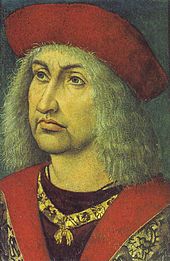- Albert III, Duke of Saxony
-
"Albert, Duke of Saxony" redirects here. For the 13th century duke, see Albert I, Duke of Saxony.
Albert III 
Duke of Saxony Reign 7 September 1464 – 12 September 1500 Predecessor Frederick II Successor George Margrave of Meissen Reign 7 September 1464 – 12 September 1500 Predecessor Frederick VI Successor George II Spouse Sidonie Podiebrad of Bohemia Issue Catherine, Archduchess of Austria
George, Duke of Saxony
Henry IV, Duke of Saxony
Frederick, Grand Master of the Teutonic KnightsHouse House of Wettin Father Frederick II, Elector of Saxony Mother Margaret of Austria Born 27 January 1443
GrimmaDied 12 September 1500 (aged 57)
EmdenBurial Meissen Religion Roman Catholicism Albert III (German: Albrecht) (27 January 1443 – 12 September 1500) was a Duke of Saxony. He was nicknamed Albert the Bold or Albert the Courageous and founded the Albertine line of the House of Wettin.
Albert was born in Grimma as the third and youngest son (but fifth child in order of birth) of Frederick II the Gentle, Elector of Saxony, and Margarete of Austria, sister of Frederick III, Holy Roman Emperor. Later, he was a member of the Order of the Golden Fleece.
After escaping from the hands of Kunz von Kaufungen, who had abducted him together with his brother Ernest, he spent some time at the court of the emperor Frederick III in Vienna.
In Eger (Cheb) on 11 November 1464 Albert married Zdenka (Sidonie), daughter of George of Podebrady, King of Bohemia; but failed to obtain the Bohemian Crown on the death of George in 1471.
After the death of his father in 1464, Albert and Ernest ruled their lands together, but in 1485 a division was made by the Treaty of Leipzig, and Albert received the Meissen, together with some adjoining districts, and founded the Albertine branch of the House of Wettin.
Regarded as a capable soldier by the emperor, Albert (in 1475) took a prominent part in the campaign against Charles the Bold, duke of Burgundy, and in 1487 led an expedition against Matthias Corvinus, King of Hungary, which failed owing to lack of support on the part of the emperor.
In 1488 he was appointed Stadtholder of the Netherlands (until 1493) and marched with the imperial forces to free the Roman king Maximilian from his imprisonment at Bruges, and when, in 1489, the King returned to Germany, Albert was left as his representative to prosecute the war against the rebels. He was successful in restoring the authority of Maximilian in Holland, Flanders and Brabant, but failed to obtain any repayment of the large sums of money which he had spent in these campaigns.
His services were rewarded in 1498 when Maximilian bestowed upon him the title of Hereditary governor (potestat) of Friesland, but he had to make good his claim by force of arms. He had to a great extent succeeded, and was paying a visit to Saxony, when he was recalled by news of a fresh rising. Groningen was captured, but soon afterwards the duke died at Emden. He was buried at Meissen.
Albert, who was a man of great strength and considerable skill in feats of arms, delighted in tournaments and knightly exercises. His loyalty to the emperor Frederick, and the expenses incurred in this connection, aroused some irritation among his subjects, but his rule was a period of prosperity in Saxony.
Ancestry
Albert's ancestors in three generations Albert, Duke of Saxony Father:
Frederick II, Elector of SaxonyPaternal Grandfather:
Frederick I, Elector of SaxonyPaternal Great-grandfather:
Frederick III, Landgrave of ThuringiaPaternal Great-grandmother:
Katherina von HennebergPaternal Grandmother:
Catherine of BrunswickPaternal Great-grandfather:
Henry the Mild, Duke of Brunswick-LüneburgPaternal Great-grandmother:
Sophie of PomeraniaMother:
Margaret of AustriaMaternal Grandfather:
Ernest, Duke of AustriaMaternal Great-grandfather:
Leopold III, Duke of AustriaMaternal Great-grandmother:
Viridis ViscontiMaternal Grandmother:
Cymburgis of MasoviaMaternal Great-grandfather:
Siemowit IV, Duke of MasoviaMaternal Great-grandmother:
Alexandra of LithuaniaFamily and children
With his wife Sidonie, Albrecht had nine children:
- Katharina (b. Meissen, 24 July 1468 - d. Göttingen, 10 February 1524), married firstly on 24 February 1484 in Innsbruck to Duke Sigismund of Austria, and secondly on 1497 to Duke Erich I of Braunschweig-Kalenberg.
- Georg "der Bärtige" (b. Meissen, 27 August 1471 - d. Dresden, 17 April 1539).
- Heinrich V "der Fromme" (b. Dresden, 16 March 1473 - d. Dresden, 18 August 1541).
- Frederick (b. Torgau, 26 October 1474 - d. Rochlitz, 14 December 1510), Grand Master of the Teutonic Knights.
- Anna (b. Dresden, 3 August 1478 - d. Dresden, 1479).
- Stillborn child (1479).
- Ludwig (b. Torgau, 28 September 1481 - d. Torgau?, some days later / d. Torgau?, young after 1498) [?].
- Johann (b. and d. Torgau, 24 June 1484).
- Johann (b. Torgau, 2 December 1498 - d. Torgau?, some days later / d. Torgau?, young in September of the same year as his brother Ludwig) [?].[1]
References
 This article incorporates text from a publication now in the public domain: Chisholm, Hugh, ed (1911). Encyclopædia Britannica (11th ed.). Cambridge University Press.
This article incorporates text from a publication now in the public domain: Chisholm, Hugh, ed (1911). Encyclopædia Britannica (11th ed.). Cambridge University Press.
Preceded by
Frederick IIDuke of Saxony
1464–1500Succeeded by
GeorgeCategories:- 1443 births
- 1500 deaths
- People from Grimma
- Dukes of Saxony
- Knights of the Golden Fleece
- House of Wettin
- Saxon princes
Wikimedia Foundation. 2010.
